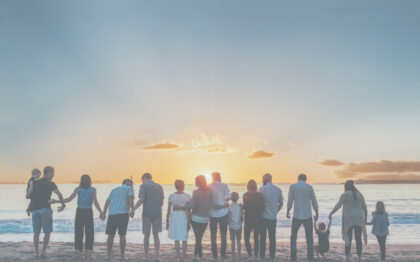It has been a very full last few days, with traumatic headlines, stories, and imagery from Israel and Palestine on top of the existing stresses within our country, in the war in Ukraine, and more. I want to explicitly invite you to reach out to me if you would like to talk or need some support.
Our UUA President, Rev. Dr. Sofía Betancourt, wrote a beautiful message on Saturday about the violence happening in Israel and Palestine, and though the situation has evolved since then, I would still like to share her words with you, as I found them a source of comfort and connection, and hope you will too. Here are her words:
Beloveds, I invite you to stop what you are doing if you can and sit with me in the depth of this tragedy. How to reconcile the cost of occupation and of war? How to nuance two very real histories of oppression and violence? I am holding close the words of U.N. Middle East peace envoy Tor Wennesland who said: “This is a dangerous precipice, and I appeal to all to pull back from the brink.”
We as a people of faith can condemn violence against civilians while at the same time engaging the full legacies and histories of oppression that shape such devastating conflict. As a faith tradition, Unitarian Universalists have long worked for peace, and our principles and values call for the goal of world community with peace, liberty, and justice for all. At the same time, we have not engaged the tangled issues surrounding Israel/Palestine in community since 2018, and our last engagement resulted in severed relationships, and deep pain.
I pray for the people of Israel and Palestine. I pray for leaders around the globe who must respond to this latest flare of violence and the untenable ethical considerations that abound. I pray for Muslim and Jewish UUs who experience the impact of this long strife acutely. I pray that those of us less likely to know the trauma of unending brutality and harm will not turn away from generational loss, from the devastating realities and their root causes, or from the relentless tragedy of war and occupation. Be gentle with yourselves when you need to be, but do not turn away unless you must. We are one global family living tenuously on the same human-impacted Earth. Let us center ourselves in justice as we call for peace.
I think her words, “Be gentle with yourselves when you need to be, but do not turn away unless you must,” apply to just about any justice work we do, just about any situation in which we find ourselves witnessing the pain of others. It is uncomfortable to even be witnesses to pain, and yet those of us less impacted are called upon to act in service to those most impacted. That will look different for each of us. It begins with not looking away, and in this case, not turning to a simple story that pretends there is an easy answer to this long-standing complex conflict.
I am also keenly aware that later this week is the 25th anniversary of the death of Matthew Shepard in Wyoming, a young gay man brutally tortured for who he was. In our own time, our LGBTQIA+ siblings are under threat from individuals full of hate, but also legislatures stripping away their rights. May we not look away from that, either.
There is much for us to hold, beloveds, and much for us to grieve. Amidst the grieving, may we find our way to words and actions of solidarity and justice.
In gratitude for this community of care,
Rev. Diana
Being Good Relatives
This Monday was Indigenous Peoples Day, and the announcements on Sunday included a brief mention of a “honor system” voluntary tax people in Minnesota can pay, in acknowledgment of our benefit of Dakota land. This is a link to an article about the program:
Here is a brief quote from the article:
While there are not enough Native people in Minnesota for all white people to have a close relationship with an Indigenous person, Intermill hopes that the honor tax can be a bridge that invites connection with the history of the land and an understanding of tribal sovereignty or government.
“This is a way for a person who is not near the reservation to come into relationship in a meaningful way that works for them, because they get to decide whatever amount, on whatever frequency they want to.”
This is one way that we can take our commitment to being good relatives (as we say in our land acknowledgment) beyond words and into action. We can contribute individually, and could even consider making a contribution as a congregation, on either a one-time or recurring basis.

